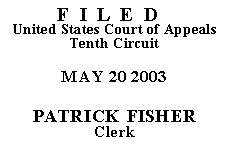

| UNITED STATES OF AMERICA,
Plaintiff-Appellee,
v.
MESA RITH Defendant-Appellant. |
No. 01-4159
(D.C. No. 2:00-CR-562-C) (Utah) |
Mr. Rith was indicted on one count of forcibly assaulting and inflicting bodily harm on a federal officer in violation of 18 U.S.C. § 111(a)(1), and one count of attempted escape from federal custody in violation of 18 U.S.C. § 751. Mr. Rith entered a guilty plea to the first count in exchange for the government recommending a reduction for acceptance of responsibility and dismissing other pending charges. The government objected to the Presentence Report, requesting the court to sentence Mr. Rith as a career offender. As a result, Mr. Rith moved to withdraw his guilty plea, arguing that his counsel did not inform him he could be sentenced as a career offender and that the representation of the extent of injury suffered by the victim of the assault in his signed Statement in Advance of Plea of Guilty was incorrect.
The district court considered both of Mr. Rith's arguments as well as the seven factors enumerated by this circuit for determining whether to allow withdrawal of a guilty plea. See United States v. Siedlik, 231 F.3d 744, 749 (10th Cir. 2000) (listing factors). It is defendant's burden to demonstrate to the district court a "fair and just reason" for the withdrawal of the plea. See United States v. Gordon, 4 F.3d 1567, 1572 (10th Cir. 1993). After careful consideration, the district court exercised its discretion and declined to permit the plea to be withdrawn. See United States v. Hickok, 907 F.2d 983, 986 (10th Cir. 1990) (withdrawal of plea within "sound discretion" of trial court). We review the district court's denial of the motion to withdraw a guilty plea for abuse of discretion. See United States v. Jones, 168 F.3d 1217, 1219 (10th Cir. 1999).
Our case law is clear that a defendant is not entitled to withdraw a guilty plea based on an erroneous prediction that he would not be sentenced as a career offender where he was well advised that imposition of a sentence different from the one he expected would not be a basis for withdrawing the plea. See, e.g., Gordon, 4 F.3d at 1570; United States v. Rhodes, 913 F.2d 839, 843 (10th Cir. 1990). Mr. Rith acknowledged on the record that the statutory maximum sentence for his offense was ten years, see rec., vol. I, doc. 27 at 1, that the district court's final calculation of his sentence might differ from anything predicted by the attorneys in the case, id. at 2, and that he would not be able to withdraw his plea based on such a difference in calculation, id.; cf. id., vol. III at 13. Given that Mr. Rith was advised there was no guarantee of any particular sentence, the district court did not abuse its discretion in denying Mr. Rith's motion on the basis of his counsel's failure to predict the correct guideline sentence.
Mr. Rith also contends a factual error as to the extent of the injury suffered by the victim of the assault constitutes grounds for withdrawal of his guilty plea. He does not dispute the fact of "bodily injury" to the victim but only the seriousness of that injury, and he asserts that because the district court did not determine the extent of "serious bodily injury" to the victim until the sentencing hearing, Apprendi v. New Jersey, 530 U.S. 466 (2000), was violated. Mr. Rith is incorrect.
"Serious bodily injury" is a sentencing factor, rather than an element of the offense that would increase Mr. Rith's maximum penalty. See U.S. Sentencing Guidelines Manual § 2A2.2(b)(3). Conversely, only the lesser standard of "bodily injury" is required to enhance the statutory maximum sentence for his offense to ten years.(1) See 18 U.S.C. § 111(b). Mr. Rith pled guilty to assault involving "bodily injury," and the district court properly recited the statutory maximum of ten years. Thus, no Apprendi violation occurred in this case. The district court did not abuse its discretion in denying Mr. Rith's motion to withdraw his guilty plea on this basis.
In addition to its consideration of these two specific arguments raised by Mr. Rith, the district court considered all seven factors this circuit has enumerated for determining whether to permit withdrawal of a guilty plea, finding none that warranted withdrawal. See Siedlik, 231 F.3d at 749. We find no abuse of discretion in the district court's assessment of these factors.
Accordingly, we AFFIRM.
ENTERED FOR THE COURT
Stephanie K. Seymour
Circuit Judge
*.After examining appellant's brief and the appellate record, this panel has determined unanimously that oral argument would not materially assist the determination of this appeal. See Fed. R. App. P. 34(a)(2) and 10th Cir. R. 34.1(G). The case is therefore submitted without oral argument. This order and judgment is not binding precedent, except under the doctrines of law of the case, res judicata, and collateral estoppel. The court generally disfavors the citation of orders and judgments; nevertheless, an order and judgment may be cited under the terms and conditions of 10th Cir. R. 36.3.
1. In United States v. Segien, 114 F.3d 1014, 1020 (10th Cir. 1997), we held "bodily injury" was not an element, but a sentencing factor. However, as we recently pointed out in United States v. Hathaway, 318 F.3d 1001, 1006-07 (10th Cir. 2003), that decision has been superseded by a contrary opinion of the Supreme Court in Jones v. United States, 526 U.S. 227, 229 (1999), which makes clear that a statute such as the one before us must be construed as creating separate offenses rather than one offense with separate punishments.